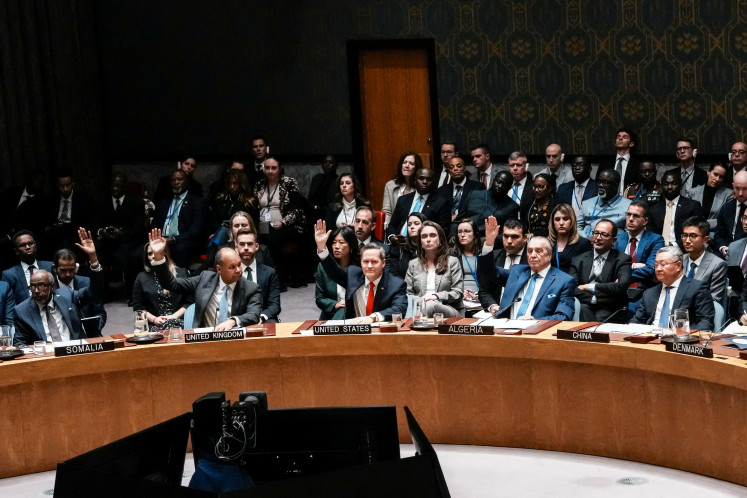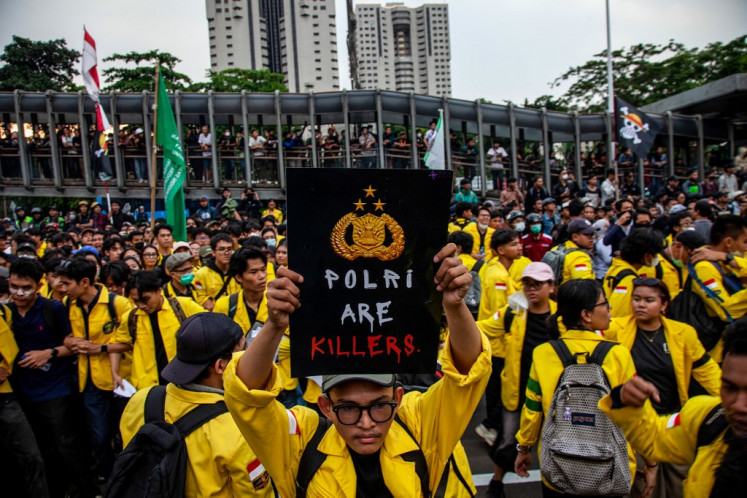Popular Reads
Top Results
Can't find what you're looking for?
View all search resultsPopular Reads
Top Results
Can't find what you're looking for?
View all search resultsRI to import 4.5m tons of LNG starting in 2013
Indonesia, one of the world’s largest liquefied natural gas (LNG) producers, will begin importing up to 4
Change text size
Gift Premium Articles
to Anyone
I
ndonesia, one of the world’s largest liquefied natural gas (LNG) producers, will begin importing up to 4.5 million tons of LNG every year beginning in 2013 in order to meet the surging domestic demand.
Rudi Rubiandini, a senior official at upstream oil and gas regulator BPMigas, said Wednesday that Indonesia needed to import because almost all Indonesia’s current LNG production was allocated for export.
LNG importing would begin after four LNG receiving terminals currently being built in Aceh, North Sumatra, Jakarta and Central Java were ready to start commercial operations sometime in 2013,
Rudi said.
“Actually, if we had the receiving terminals we could start importing the gas now. But we don’t have the facilities to store the gas now,” he said at the 2011 Pacific Energy Summit in Jakarta.
According to data from BPMigas, in 2011 the natural gas allocation for domestic customers was 56.78 percent or 4,366 million standard cubic feet per day (mmscfd) out of a total gas production of 7,688 mmscfd. Last year, of the total production of 8,653 mmscfd, the government allocated 50.18 percent or 4,342 mmscfd for the domestic market.
Nearly half of the total gas produced in the country last year was exported, mostly in the form of LNG produced at the country’s three LNG plants: the Arun LNG plant in Aceh, the Bontang LNG plant in East Kalimantan and the Tangguh LNG plant in Papua. Indonesia is the world’s second largest LNG producer, exporting most of the gas to Japan, South Korea and Taiwan.
The country’s domestic gas users, including state-owned electricity company PT PLN and industrial companies, have been suffering from an acute shortage of gas.
The Association of Gas-using Industries (FPIB) said earlier that the government could only supply 538 mmscfd to industries, a third of their total needs.
BP Migas chairman R. Priyono predicted that the demand for gas from the industrial sector would surge significantly in the years to come due to the country’s solid economic performance and strong flow of foreign investments. Because of this, domestic production should be boosted, he said.
“To unlock Indonesia’s natural gas potential we need to improve infrastructure both at the upstream and downstream levels,” he said.
Priyono said the other important thing was how to persuade domestic buyers to purchase the gas at the market price or above US$7 per million British thermal units (mmbtu). Currently, many gas producers are reluctant to sell their gas in the domestic market because the price is determined by the government. According to the association, industries pay only $6.30 per mmbtu.
An energy expert from Stanford University in the United States, Mark C. Thurber, said Indonesia needed to gradually increase the price of gas for industrial users in order to encourage gas exploration activities.
“A strategy that some companies have used is creating dual prices where you subsidize gas sold to one part of the market, but then in another part of the market you might let the prices be like market prices,” he said.









